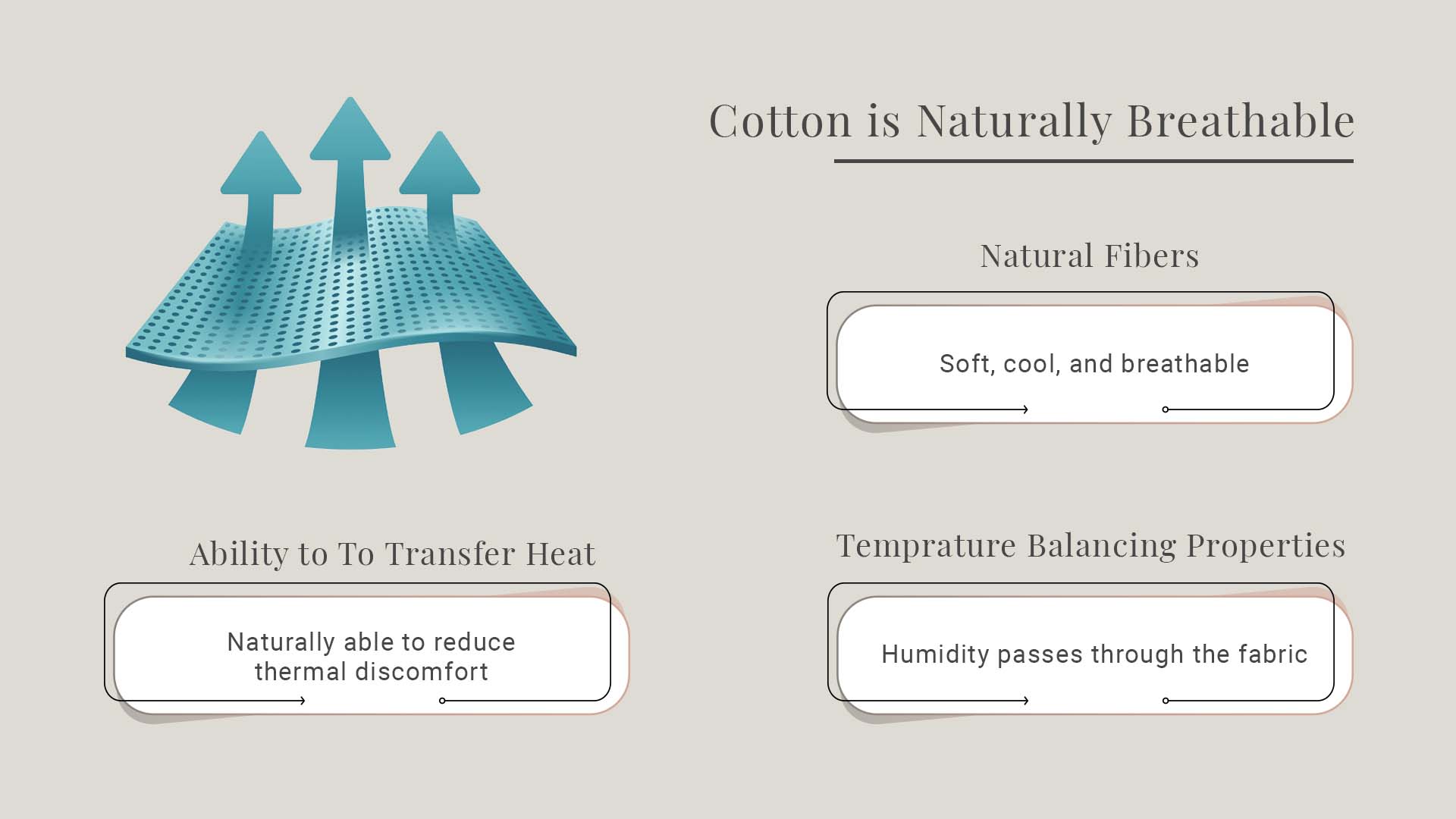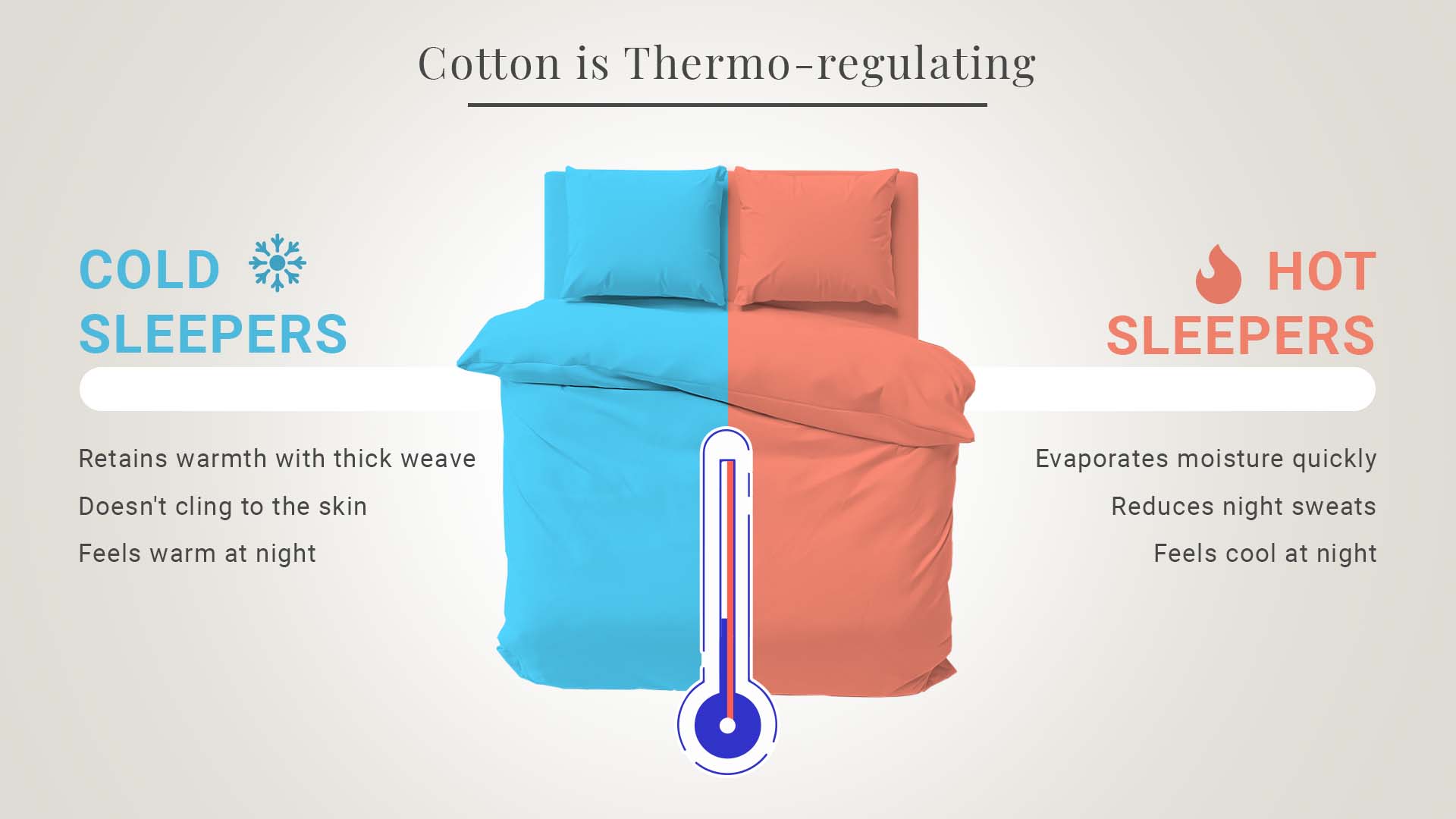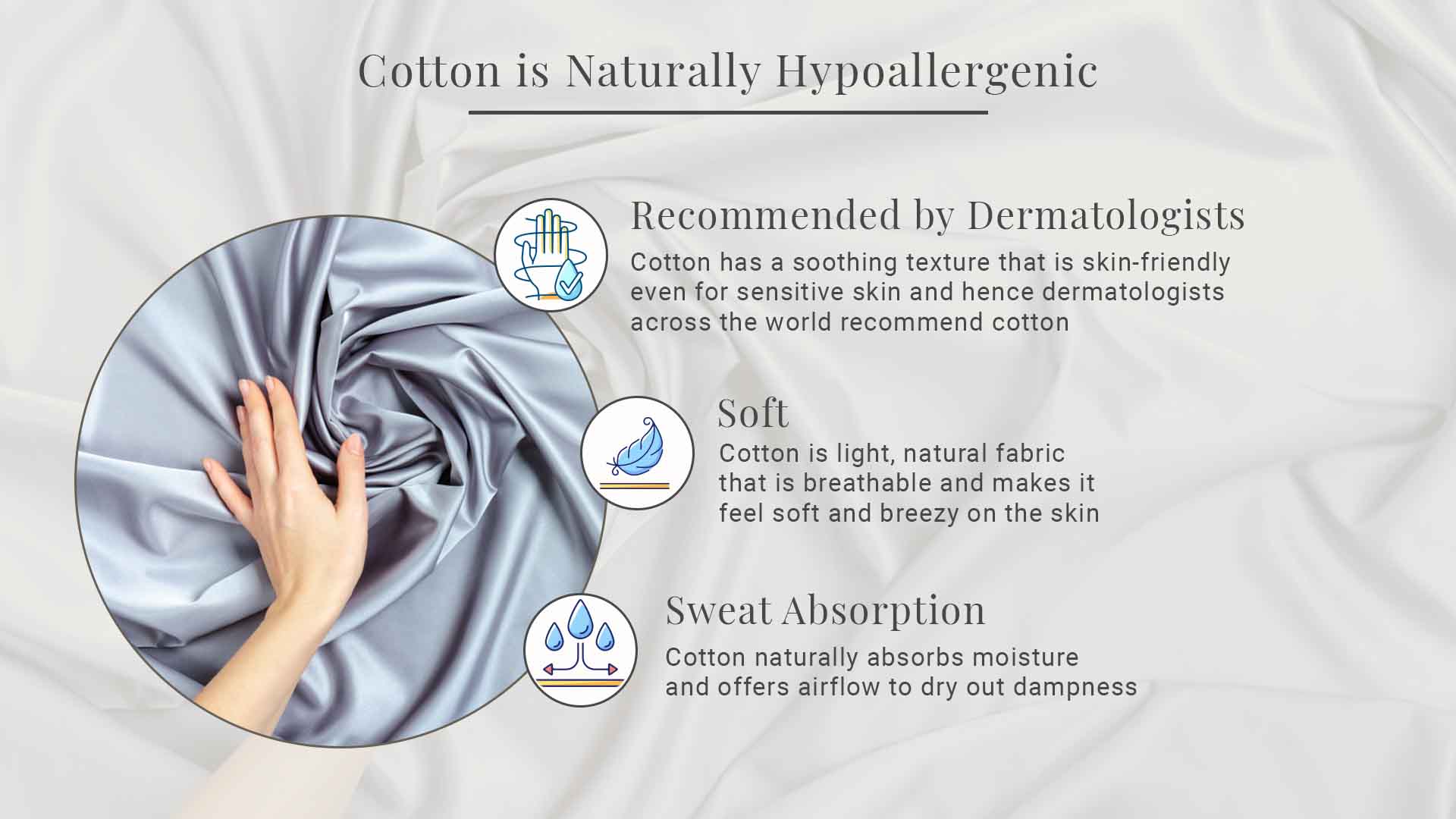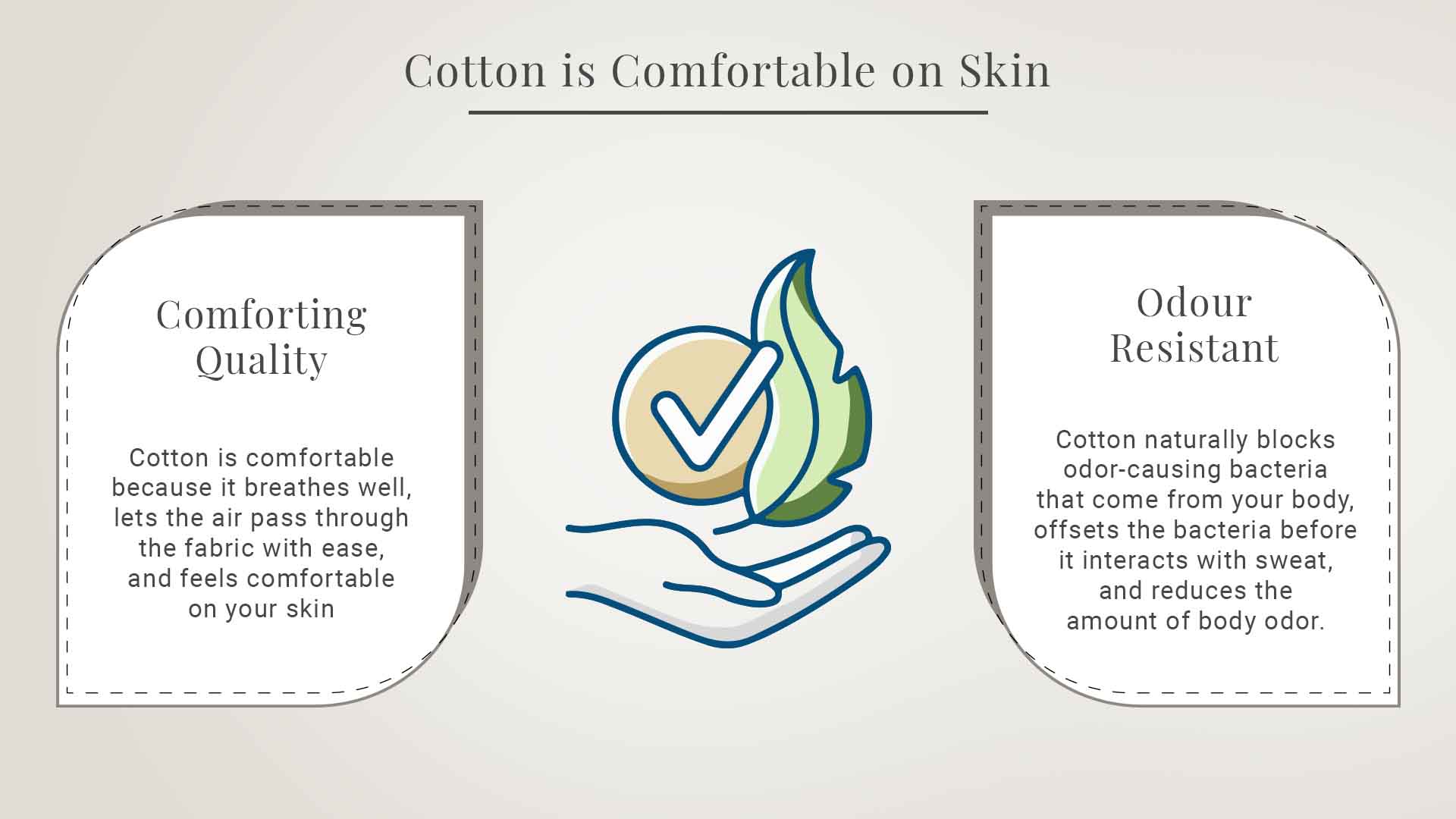8 Proven Benefits of Cotton and Naturally Cooling Sheets That Will Make You Sleep Better

Cotton is a natural fiber with a multitude of benefits that shape our lives for the better. It’s eco-friendly, versatile, and easier to care for than any other synthetic chemically processed fabric because of its natural temperature balancing ability for all-season comfort. Its innate quality of comfort is the reason cotton remains the number one fiber preferred by consumers globally in the bed linens segment as several research studies show cotton sheets are responsible for deep rejuvenating sleep. Cotton is globally preferred for its natural properties that induce relaxing sleep and improve physical, mental, and emotional wellbeing. Healthy habits are necessary to lead a healthy life and healthy life can only be achieved by deep relaxing sleep. Let’s dive into how cotton can improve our sleeping health with these 8 proven benefits sourced from research conducted by the global community.
1. Cotton Sheets Promotes Peaceful Sleep
The fiber type, weight, construction, yarn spinning system, thread/yarn count, and finishing are all vital factors considered when making cotton sheets. Cotton Incorporated, a non-profit organization funded by cotton growers in the United States further adds, the variations within these factors ultimately affect how the sheet feels and performs. The structure of cotton allows for superior absorption which keeps skin sweat-free, as the moisture absorption ability helps with fewer disturbances while sleeping. In addition to that cotton is naturally hypoallergenic, making it a great choice for people with sensitive skin. Cotton’s soothing qualities appeal to the senses making us feel safe. Sleep is a sensory experience, as concluded by a large-scale survey about the effects of the environment on sleep, and this soothing quality of cotton helps to create a relaxing environment. The study goes on to report the optimal sleep environment temperature is determined to be 24.2 degrees Celsius, or about 75 degrees Fahrenheit. Measurements taken in a field study showed a strong relationship between a person’s satisfaction with their sleep environment and their sleep quality. Cotton combining its soothing feel on the skin and temperature regulating properties ensure that the sleeper is comfortable throughout the night and wakes up feeling refreshed and energized.
2. Cotton is Naturally Cooling
Compared to other fabrics cotton is cooler as it is more breathable than most other cooling sheets. The breathability of cotton is the ability to allow moisture vapor or humid air to move through it relatively more easily than other synthetic fabrics. The National Science Foundation further adds that this airflow prevents hot air from being trapped and the breathability comes from the shape of cotton fibers. The USCB Materials Research Laboratory states these cotton fibers resemble twisted ribbons, and prevent them from stacking tightly together when woven. Thus, there is an adequate number of open spaces for air to pass through. On the other hand, synthetic fibers have no space for ventilation. Moreover, cotton is hydrophilic (water sticks to the fibers) which helps by wicking liquid water (e.g., sweat, moisture from air) away from the sleeper's skin. In combination with airflow, this helps in the evaporation of water, providing an evaporative cooling effect that can be greater than that of damp bare skin. The UCSB ScienceLine program shares, that evaporation helps to cool because the transition from liquid to vapor requires energy, which is taken in from the surroundings, thereby lowering the temperature of the surroundings.
3. Cotton is Naturally Breathable

Since cotton bedding is able to transfer heat from the skin to the outside environment, it can naturally reduce thermal discomfort. This helps the body's moisture to evaporate quickly and comfortably. Cotton fibers are natural fibers, which are soft, cool, and breathable, as well as absorbent, and can hold water 24–27 times their own weight. Additionally, cotton is breathable and never clings to the skin making it functional and comfortable. Cotton sheets are crafted from natural fibers and have excellent temperature-balancing properties so the humidity easily passes through the fabric thereby; you feel cool during summers and warm in winters. Cotton bed linen is the best cooling sheet for hot sleepers who sweat a lot and cool down their system giving them ideal deep sleep.
4. Cotton is Thermo-regulating

Cotton regulates the body temperature and is ideal for both hot sleepers and cold sleepers due to its temperature-balancing properties. Finding a fabric which will work for both hot and cold sleepers is always a struggle but cotton is a perfect for both kinds of sleepers because cotton made with sateen weave tends to be thicker than any other weave, like percale for example, and is relatively dense.
The sateen weave pattern allows for more thread surface which means you get a luxurious, thick, and silky feel. Being more tightly woven, the sateen weave cotton bed sheets tend to wrinkle less while the soft texture of this weave makes it ideal for year-round use.
The 4-over-and-1-under weaving pattern makes the pure long-staple cotton yarn more smooth, rich, and without the sheen. The more vertical threads than the horizontal ones produce an exceptionally soft surface that resembles satin. The bedsheets are inviting, and look like the sheets at a 5-star luxury hotel even after prolonged use.
Adding cotton to your bedding set will keep cold sleepers warm enough to sleep peacefully without drenching in sweat. Similarly for hot sleepers, cotton with its enhanced breathability ensures ventilation to keep the skin feel comfortable without feeling damp or clingy making the hot sleeper sleep peacefully for the entire night.
The naturally thermo-regulating properties of cotton make it ideal for deeply restful sleep. Controlled laboratory studies show that cotton keeps you cooler while sleeping, as it maintains the decrease of body temperature after sleep onset. Those resting on cotton registered the least brain activity during the study and fewer fluctuations in body temperature compared to other fibers, indicating deeper sleep. The Cotton Incorporated’s 2020 Home Textile Consumer Survey sheds light on how body temperature and comfortable bedding play a crucial role in providing a deep comfortable sleep. The study also states that high absorbency and sweat-wicking quality give sleepers an undisturbed sleep throughout the night for both hot sleepers and cold sleepers alike.
5. Cotton is Naturally Hypoallergenic

Cotton is recommended by dermatologists for those with skin sensitivities and allergies because it has a soothing texture that are ideal for comfort. The fabrics that touch our skin can impact our skin health, that’s why sticking to ultra-soft, natural fibers, like high thread count cotton sheets are comfy materials that allow your skin to slip and slide easily across their surface. This reduces any friction your skin might experience as you toss and turn in the night. Cotton linens with their skin-soothing effects, ensure you have peaceful sleep without any kind of disturbance. While most of the smooth texture fabrics in bedsheets come with a price tag, Dr. Zeichner and dermatologist Dendy Engelman, MD, believe investing in sheets that care for your skin can be an investment worth making.
6. Cotton is Comfortable on Skin

Soft, breathable, and natural, cotton remains the number one preferred textile product in the US consumer market, because it is soft to the touch, natural, hypoallergenic, and durable. It feels comfortable on the skin because it feels gentle on the skin and has a comforting quality that none of the other fabrics possess. In addition to cotton’s natural thermo-regulating properties that help to evaporate moisture quickly, cotton is also odor resistant. As cotton fibers release body odors, it leads to fabrics that smell fresh. Other fabric, for example, Polyester, leads to a bad smell which would require anti-bacterial technology to control the odor.
7. Cotton is Eco-friendly
Cotton has a low ecological impact that makes it popular across all home textile industries. Its natural origin distinguishes it from other synthetic and man-made fibers and unlike synthetic fibers such as polyester, which are derived from crude oil, cotton is grown on farms, and not produced in labs or from crude oil, making it highly sustainable and environmentally friendly.
8. Cotton is Easier to Maintain
Cotton is much easier to care for and maintain compared to other fabrics but it requires special care to keep them long-lasting. Below are a few laundry tips that are helpful to keep them feeling fresh and new every time you use them.
- Opt for gentle cycle while using the washing machine and tumble-dry low. Put the sheet open instead of rolled or folded in the washer, they will wash better and feel fresher for use.
- Wash linens separately to keep them away from pilling and wrinkling.
- Add detergent to the water instead of pouring it right onto your bed linens. Keep hues bright by not using bleach to avoid color loss.
- Use warm water using mild detergent for softness and durability. To get rid of dust mites / bacteria if any, you can also wash in hot water (60° C/140° F). If you want extra soft sheets, you may add softener into the rinse cycle.
- Remove sheet from washer and dryer quickly to reduce wrinkles.
- Do not bone dry the sheets as this will make the fabric stiffer, extremely wrinkled and of lower life. We recommend line drying to avoid wrinkling.
- Remove from the dryer slightly moist and then simply spread them on to the bed by hand pressing them to minimize wrinkles.
- Steam iron your pillow cases and sheets for a complete brand-new feel. Wash your sheets once a week for the fresh sleep.
References
1.https://www.cottonworks.com/wp-content/uploads/2021/03/Cotton-Sheets-Buying-Guide_Spreads.pdf
4. https://www.medicalnewstoday.com/articles/best-sheets-for-hot-sleepers#ideal-temperature
5. https://www.healthline.com/nutrition/17-tips-to-sleep-better
6. http://www.zeichnerdermatology.com/
7. http://www.drdendyengelman.com/
8. https://www.wellandgood.com/best-treatments-psoriasis/
9. https://www.healthline.com/nutrition/17-tips-to-sleep-better
10. https://www.medicalnewstoday.com/articles/best-sheets-for-hot-sleepers#why-so-hot
11. https://www.sciencedirect.com/science/article/pii/B9781845695392500028
12. https://thesleepdoctor.com/2020/08/19/latest-science-on-how-to-create-your-ideal-sleep-environment/


 United Kingdom
United Kingdom United States
United States United Kingdom
United Kingdom Canada
Canada Australia
Australia













